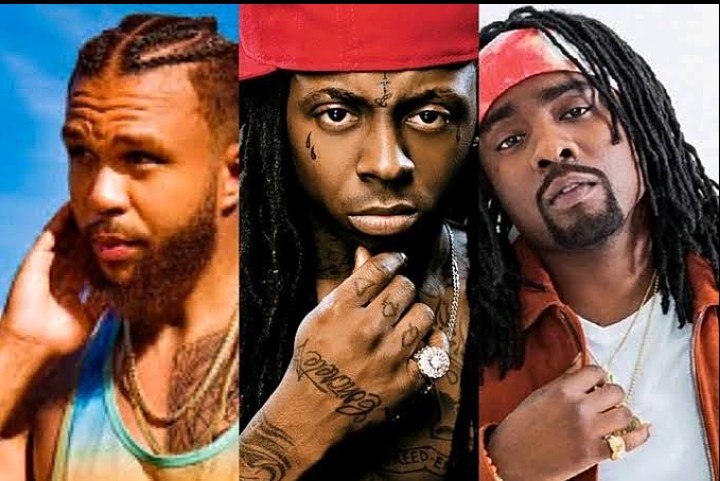….In today’s article, we will be looking at 10 American Rappers You Didn’t Know Were Nigerians!
Dax Daniel (Dax): The Canadian Rapper with Nigerian Roots
If you haven’t heard of Dax before, you’re in for a treat! Dax is a Canadian rapper with some strong Nigerian roots. Dax grew up in Canada, but here’s the twist – his parents are of Nigerian descent, specifically from the IBO tribe in the southeastern part of Nigeria. He spent his early years in Canada but later moved to Los Angeles, California to chase his dream of becoming a rap star.
Claim to Fame: Dax made a name for himself when he dropped a music video that caught everyone’s attention. The song was “Catch Me Outside,” and it featured Danielle Bregoli. This happened in April 2021, and it catapulted him to stardom in the American rap scene.
Nigerian Connection: In April 2021, Dax made a statement about his roots. He got a tattoo of the Nigerian flag on his neck and said, “Yes, I am Nigerian.” It was his way of proudly acknowledging his Nigerian heritage.
- Advertisement -
Dax Daniel, or simply Dax, The Canadian rapper with deep Nigerian roots has achieved quite a bit in the music industry but the rapper doesn’t shy away from celebrating his Nigerian and african background.
Dave (Santa Dave): The British Rapper with Nigerian Roots
Dave with stage name, Santan Dave is a British rapper with strong Nigerian ties. Dave was born on June 5, 1998, and he comes from Angeli Town in Briston, a part of South London. His parents are originally from Nigeria, specifically from the Edo ethnic group, which is in the south-south region of Nigeria.
Family and Early Challenges: Dave’s dad, Frank Omoregie, worked as a pastor, while his mom, Julia Doris Omoregie, raised him and his two older brothers. Sadly, when Dave was just a baby, his dad faced some visa problems and had to go back to Nigeria. It turned out he thought he had a missionary visa, but it was actually just a visitor’s visa.
Music Career: From a young age, Dave was passionate about music. He started writing his own lyrics when he was only 11 years old. This early interest in music eventually led him down the path to becoming a rapper.
Dave’s career in music is quite impressive. He has not only made a name for himself, but he’s also used his music to speak out against important issues like racism. His collaborations with other artists who share his vision have made a significant impact in the uk Rap scene.
Lil Wayne: The American Rap Icon with Nigerian Heritage
Lil Wayne is one of the most iconic American rappers of our time. Born as Dwayne Michael Carter Jr., on September 27, 1982, Lil Wayne’s story is even more interesting when you learn about his Nigerian roots.
Early Life: Lil Wayne’s journey began in New Orleans, Louisiana, but his family background is a blend of cultures. His parents separated when he was just two years old. His father, Dwayne Michael Turner, left after the divorce, and his mother, Jacida Carter, raised him.
From an early age, Lil Wayne showed an exceptional talent for music. He started rapping when he was just eight years old and quickly gained recognition for his skills.
The Rise to Stardom: Lil Wayne’s career officially kicked off in 1997 when he was signed by rapper Birdman. He became the youngest member of Cash Money Records, a prominent label in the music industry. From there, his star continued to rise, and he became a flagship artist for the record label.
A Surprising Revelation: Lil Wayne’s connection to Nigeria came as a surprise to many. During an interview with Drink Champs, he made an interesting revelation. He said, “Shout out to Nigeria. I did my ancestry.com, and it came back like 53% Nigerian.” It was a moment of self-discovery for the rapper. He even joked that he needed to have a talk with his mom about it.
Lil Wayne didn’t stop there. He also shared his plans of visiting Nigeria and Egypt soon. It’s a journey many fans are eagerly waiting to hear about. Next on our list is rotimi
Rotimi Akinosho (Rotimi): The Multitalented Nigerian Star
Rotimi Akinosho, famously known as Rotimi. is not only an actor but also a singer and rapper. Born in Maplewood, New Jersey, Rotimi comes from a proud Nigerian family. His name, Rotimi, is of Yoruba origin and translates to “stay with me” in English. His father, an investment banker, hails from the Yoruba ethnic group, while his mother has roots in the Igbo tribe.
Rotimi’s family ensured that he stayed closely connected to his Nigerian heritage while growing up. He spent his summers in Nigeria, visiting his mother’s family in Imo State and his dad’s family in Lagos. These visits played a vital role in keeping his Nigerian identity alive.
Career in Entertainment: Rotimi’s journey in the entertainment industry began with acting. He gained recognition for his role as Darius Morrison in the STARZ series “Boss” and as Andrew Coleman on “Power.” He showcased his acting prowess before venturing into music.
Musical Pursuits: In the music world, Rotimi has also made a name for himself. He’s not only a singer but also a rapper. His musical career has been steadily rising, with notable tracks and collaborations.
Rotimi has never forgotten his Nigerian roots. In interviews, he proudly talks about his heritage and how those summers spent in Nigeria shaped his worldview.
SEE ALSO: Afrobeats Fusion: The Art of Blending Traditional African Rhythms with Contemporary Sounds
Char Millionaire (Char Millionaire)
Char Millionaire roots trace back to Nigeria. Born Hakeem Sariki on October 9, 1980, in Washington, D.C., he comes from a family culturally diverse and rich. His father hails from Nigeria, specifically from the Yoruba ethnic group, known for their vibrant traditions, music, and art. In contrast, his mother is of African-American descent and follows the Christian faith.
Growing up in a household distinct in cultures. Char had the privilege of experiencing the best of both worlds. He was immersed in the customs, traditions, and values of his Nigerian heritage through his father’s side, while simultaneously being exposed to African-American culture through his mother’s side. This unique blend of cultural experiences left an indelible mark on his identity.
Musical Journey: As Char Millionaire embarked on his musical journey, this multicultural upbringing became a source of inspiration. He drew upon the rhythms, melodies, and stories of both his Nigerian and African-American roots to craft his distinct musical style. This fusion of influences has set him apart in the music industry.
As he ventured into the world of music, his talent quickly caught the attention of many. In 2005, he signed with Universal Records, a significant step in his career.
Under Universal Records, Char Millionaire released the album “Sound of Revenge.” This album featured hit singles like “Tony Rob” featuring Lil’ Flip and the Grammy-winning hit “Ridin'” featuring Crazy Bone of Bone Thugs-N-Harmony. These successes solidified his presence in the music industry.
Nigerian Pride: Char Millionaire has always been vocal about his Nigerian heritage. He takes immense pride in representing his Yoruba roots, both through his music and his public persona.
Jidenna (Jidenna Theodore)
Jidenna Theodore, known simply as Jidenna. Born on May 4, 1985, in Wisconsin, USA, Jidenna is a Nigerian-American singer and rapper who has made waves in the music industry.
Early Life and Family Background: Jidenna was born in Wisconsin to Tama, an accountant, and Oliver, a Nigerian Igbo academic. Jidenna’s roots can be traced back to Nigeria, specifically to the Igbo tribe, known for their rich cultural heritage and contributions to the African diaspora.
When Jidenna was just six years old, his family made the journey back to Nigeria, where his father, Oliver, took up a position as a professor of computer science at Enugu State University. Jidenna spent his formative years in Nigeria, immersing himself in the culture, traditions, and values of his homeland.
A few years later, when Jidenna was a teenager, his family moved back to the United States. This cross-continental upbringing left a mark on his identity and would later influence his music and style.
Musical Career: Jidenna rose to worldwide fame with his 2015 hit single “Classic Man” featuring Roman GianArthur. This track quickly gained recognition and put Jidenna on the map as a talented artist. In 2017, he released his debut album titled “The Chief,”
Jidennais is known for his distinct style, often seen wearing traditional Nigerian clothing. He represents Nigerian culture through his music and his unique sense of fashion. Born in the USA, but with roots deeply embedded in Nigeria, he continues to bridge the gap between these two worlds through his music, style, and cultural representation.
Skepta:
Born on September 19, 1982, in Tottenham, North London, Skepta, whose real name is Joseph Junior Adenuga Jr., is a British rapper and record producer. Skepta’s roots trace back to Nigeria, where his parents come from.
His father is from the Yoruba ethnic group, a prominent Nigerian tribe known for its vibrant culture and traditions, while his mother hails from the Igbo tribe, another influential ethnic group in Nigeria. This diverse cultural background has significantly influenced Skepta’s art.
One of the unique aspects of Skepta’s identity is his connection to Nigeria, often emphasized through his music and public persona. He’s known for his catchphrase, “Agbada Must Come Back,” which celebrates traditional Nigerian clothing and culture.
On April 4, 2018, Skepta received a significant honor in his homeland. He was bestowed with a chieftaincy title in his hometown in Ogun State, Nigeria, becoming the “Amuludun of Odu Aje” (Chief Entertainer of Odu Aje). This recognition was not just a personal achievement but also a celebration of his contributions to both British and Nigerian music scenes.
Influence on UK Music: Skepta’s impact on the UK music scene cannot be overstated. He’s been a pioneer of grime music, and his influence has extended far beyond the borders of Britain. His ability to blend his British and Nigerian influences into his music has made him a global sensation.
Wale (Stage Name: Wale)
Olubowale Victor Akintimehin, Born on September 21, 1984, and famously known as Wale, is an American rapper, singer, and songwriter. His journey in the music world is as dynamic as his Nigerian heritage.
Wale’s story begins in Northwest Washington, D.C. However, his family background is firmly rooted in Nigeria. Both of his parents, who came to the United States in 1979, belong to the Yoruba ethnic group, a cultural tribe in southwestern Nigeria.
Growing up in a household steeped in Nigerian culture, Wale often talked about the influence of his heritage on his upbringing. He’s mentioned in interviews that he sees himself as “a Nigerian first” because his blood and roots trace back to Nigeria.
Wale’s journey in the music industry began in the mid-2000s. He gained recognition with hits like “Dig Dug (Shake It),” “W.A.L.E.D.A.N.C.E.,” and “Nike Boots.”
Collaborations with Nigerian Artists: Wale hasn’t just celebrated his Nigerian heritage in words; he’s also done it through his music. He has collaborated with several Nigerian artists, including Wizkid, Davido, and Olamide. These collaborations have not only produced hit songs but also solidified his connection to Nigeria’s vibrant music scene.
Tyler, the Creator
Tyler Gregory Okonma, Tyler, Born on March 6, 1991 is an American rapper, singer, songwriter, record producer, and fashion designer known for his innovative approach to music and fashion. He goes by the stage moniker Tyler, the Creator.
Tyler, the Creator was raised in Ladera Heights, California. He burst onto the music scene in the late 2000s as the co-founder of the hip-hop collective Odd Future Wolf Gang Kill Them All (Odd Future for short). This group quickly gained recognition for their unique sound and style.
Musical Innovation: Tyler, the Creator’s music is characterized by its boundary-pushing creativity and unconventional themes. He is known for his distinctive production style and witty, often controversial lyrics. His albums, including “Goblin,” “Wolf,” and “Flower Boy,” have received critical acclaim and showcase his evolution as an artist.
Tyler isn’t just limited to music; he’s also made his mark in the fashion world. He founded his clothing brand, Golf Wang, which has gained popularity for its colorful and eccentric designs. Tyler’s sense of style is as unconventional as his music, making him a fashion icon in his own right.
Nigerian Roots: While Tyler, the Creator’s creative genius is well-known, you might not be aware of his Nigerian heritage. Tyler was born to a Nigerian Igbo father and an American mother. In respect to his roots, he is primarily known for his American upbringing.
Tyler, the Creator’s blend of music, fashion, and personal style continues to captivate audiences worldwide, and his Nigerian roots add another layer to his multifaceted identity.
Chika (Chika Jane)
Born on March 9, 1997, in Montgomery, Alabama, Chika Jane is an American rapper, singer, and songwriter who takes immense pride in her Nigerian heritage. Her family background and roots are a significant part of her identity and artistic expression.
Chika’s family hails from Nigeria, specifically from the Igbo ethnic group. Chika’s parents, as proud Igbo descendants, have instilled in her a deep appreciation for her Nigerian roots.
Growing up in a Nigerian-American household, Chika was immersed in the customs and traditions of her Nigerian heritage. She often speaks about how this multicultural upbringing has shaped her perspective on life and her art.
Rise to Fame: Chika gained significant attention in the music industry through her viral freestyle videos on social media platforms. Her talent and unique voice quickly caught the ears of many, and she gained a massive following.
One of Chika’s notable moments in her career was her viral video titled “A Letter to Kanye,” which criticized Kanye West for his support of Donald Trump and political commentator Candace Owens. This video catapulted her into the spotlight and showcased her willingness to use her platform to address important social and political issues.
Chika is the youngest of three siblings, and her upbringing was influenced by her Nigerian-American family.
Conclusion
As we come to the end of this article, it is important to note that these American rappers with Nigerian roots remind us of the beauty in embracing our heritage while making our mark in the world. They show that our roots are not just a part of us but a source of strength and creativity. As they blend cultures and bridge continents, they inspire us all to celebrate our unique stories and voices.





